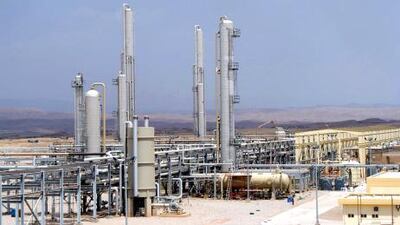Dana Gas swung back to profit in the fourth quarter of last year after almost doubling its Egyptian oil and gas reserves.
The Sharjah company's net income for the final three months of last year reached Dh59 million (US$16m), compared with a loss of Dh193m loss for the same period in 2009. Revenue increased 46 per cent to Dh539m, according to preliminary year-end data.
Dana's full-year profit last year rose 80 per cent compared with 2009 to Dh158m on Dh1.79 billion of revenue. A 22 per cent production increase from its Egyptian reserves accounted for most of the company's sales increase.
Ahmed al Arbeed, the chief executive of Dana, said he was optimistic about all of the company's projects, despite the political turmoil in Egypt and a long-running dispute over Iranian gas exports to Sharjah.
"Egypt has not changed [for us] at all. We are still producing there. We don't really expect problems," Mr al Arbeed said.
Even in the case of a regime change, the administration overseeing the country's oil and gas sector would stay intact, he predicted.
"The system in the Egyptian oil sector is well established. There are over 70 operators in Egypt … the contracts will continue." Mr al Arbeed said Dana did have a plan for evacuating expatriate staff working in Egypt because communications from within the country had become difficult.
Gaffney Cline, the UK advisory firm, assessed Dana's proved reserves in Egypt at 89 million barrels of oil equivalent (boe) at the end of last year, up from 47 million boe at the end of 2009. The company was producing 42,000 boe a day from Egypt at the end of last year.
Mr al Arbeed said he had not given up on Dana's long-delayed plan to market Iranian gas in the UAE that its Sharjah affiliate Crescent Petroleum had expected to start importing five years ago.
"We cannot forget this important project," he said. "This concerns the country where we have our headquarters. We promised the people that we would bring the gas, so we will do this."
Crescent served the National Iranian Oil Company (NIOC) with an arbitration notice in July 2009. A ruling was expected towards the end of this year, Mr al Arbeed said.
"We understand that NIOC has recently introduced hydrocarbons into the completed upstream facilities within Iran to progress the commissioning and testing activities," Dana said in its preliminary year-end report.
"This potentially allows for contractual gas deliveries to commence." In Iraqi Kurdistan, where the Pearl Petroleum consortium in which Dana holds a 40 per cent interest has been supplying gas to two power stations for the past two years, an agreement between the regional government and Iraq's federal government is in the final stages of negotiation.
It would allow Pearl to recover the cost of its investment, Mr al Arbeed said.
"We expect to get our money back," he said. "We are one of the major investors in the region."
Dana's investment in Kurdistan exceeds Dh1.3bn, the company said. Further development of the Kurdish gas reserves is planned to supply fuel and feedstock to local industries.
Mr al Arbeed said he hoped some of the gas would eventually be exported because that would be in the interests of both Kurdistan and Iraq.
Extending Pearl's existing gas pipeline from Erbil, the Kurdish regional capital, to the Turkish border would not be a problem, he said.
In the UAE, Dana is developing a small offshore gasfield jointly owned by Sharjah and Ajman. The main elements of a sales agreement for the gas have been finalised with the Government of Sharjah and first production from the field is expected next year, Mr al Arbeed said.

